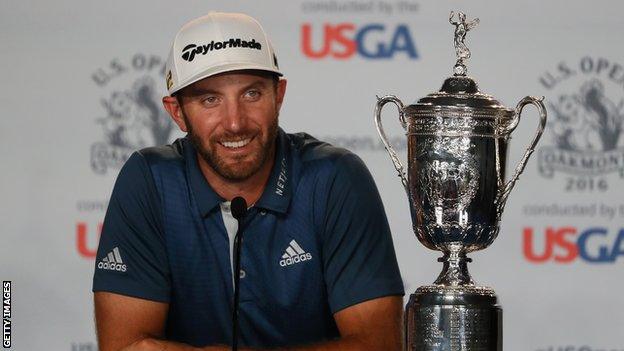Dustin Johnson's US Open controversy leads to rule change
- Published

Johnson's victory at the US Open at Oakmont saw him win his first major
Golf officials have altered the controversial rule that cost Dustin Johnson a one stroke penalty during his US Open triumph this year.
As a result of the incident that significantly overshadowed the final day at Oakmont, the United States Golf Association (USGA) was heavily criticised.
Johnson was penalised after being judged to have been responsible for moving his ball a fraction of an inch on the fifth green during the final round. He had been initially absolved by the referee with his match.
But officials then examined video evidence and informed the eventual champion, seven holes later, that he may be subject to a penalty. As a result the climax of the year's second major was farcically completed without anyone knowing the leader's score.
Johnson finished four strokes clear of the field but after meeting USGA staff was told he must alter his score on the par-four fifth from a four to a five, cutting the margin of victory to three shots.
Now the USGA, in conjunction with fellow rule-makers The Royal and Ancient, have acted to prevent similar controversies in the future.
From 1 January, 2017, tournament officials at all levels can invoke a Local Rule which eliminates the penalty when a ball is accidentally moved on a putting green.
"We took the view that the rule was not working as well as it looks on paper and that we needed to try and address this," David Rickman, executive director of governance at the R&A, told BBC Sport.
"Oakmont was clearly a difficult time and much has been said about that, but it was one of a number of cases that triggered this action."
Norway's Marianne Skarpnord suffered a similar penalty during the women's event at the Rio Olympics and Justin Thomas was also penalised at this year's Tour Championship on the PGA Tour.
"In practical terms it means that any competition organiser can introduce this Local Rule and it would mean any accidental movement of the ball on the putting green will be exempt from penalty," added Rickman.
"So if the player causes the ball to move there is no penalty, they put it back and if the player causes the ball marker to move there is no penalty, just put it back."
This change applies only to balls accidentally moved by players or caddies. If a ball changes position due to wind or some other outside agency it has to be played from its new position without penalty.
"We had talks with the professional tours at the time of the Olympics and we've been discussing it since then and all of the major professional tours and organisers of big events are expected to introduce this Local Rule straight away," Rickman added.
How did events unfold at Oakmont?
Standing over his ball on the fifth green, Johnson made two practice putts. As he prepared to address the ball to take his putt, it moved slightly.
Johnson stepped away, claiming he had not addressed the ball. He checked with a rules official, who was happy there had been no infringement, and playing partner Lee Westwood also absolved him of blame.
Johnson, who missed out on a play-off at the 2010 US PGA as a result of a rules violation, went on to par the hole.
A rules official approached Johnson on the 12th tee and, after a discussion, decided they needed to review the footage of the incident after he had completed his round because he could face a one-stroke penalty.
It meant there was some confusion out on the course among players as to how many shots Johnson was in the lead by.
The penalty stroke was eventually upheld. The USGA's director of rules Jeff Hall said he had watched video of the incident and decided Johnson's actions "could have caused the ball to move".
Hall added: "The first time we had the opportunity to speak to Dustin was the 12th hole. We asked if there was some other reason the ball could have moved. He didn't state a reason. We decided not to review it with Dustin at the media tent on the 13th hole and instead wait till the end."
- Published20 June 2016
